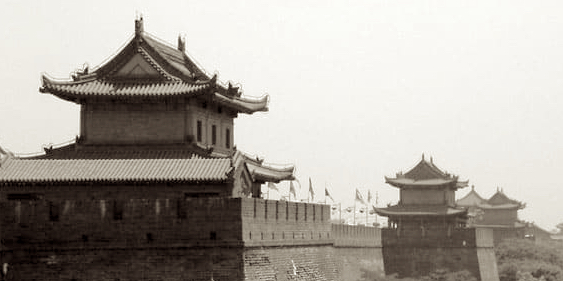
the main gate, ancient city of Xian
The Xi’an Incident:
A Turning Point for Zhou Enlai
and for China
A Research Study by Michael North and Xiaofang Zhou North
co-founders of the Zhou Enlai Peace Institute
presented April 22, 2023
Respectfully submitted to the Zhou Enlai School of Government
Nankai University, Tianjin
Complete Essay – PDF-Download
The significance of the Xi’an Incident, which transformed the destiny of modern China, is not yet fully understood. Such understanding is important, both for the Chinese people to extend their vision of continuing development and emergence as a major nation, and for the rest of the world to understand China, its people, and China’s role in the world, as an economic, cultural, diplomatic and global security power.
As Valley Forge marked the direction of the young American nation 1; as the Attack at Amritsar turned the destiny of the independent nation of India 2; as the Battle of Waterloo was the confirmation of Great Britain’s world power status 3 – so the Long March is the seminal event in the emergence of modern China 4. The Long March is one of the dominant images in the national imagination of the Chinese people. Understand the Long March, from within Chinese eyes – and you may begin to understand China. 5
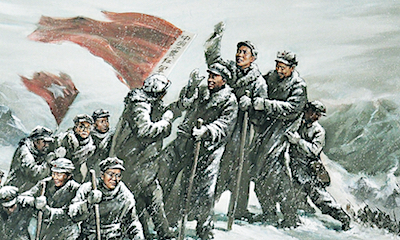
Zhou Enlai and the Red Army in the Long March
- Battle of Valley Forge; https://www.history.com/topics/american-revolution/valley-forge
- The Amritsar Massacre; https://www.historytoday.com/archive/months-past/amritsar-massacre
- Battle of Waterloo; https://www.britannica.com/event/Battle-of-Waterloo
- The Long March, an Epic Feat; https://news.cgtn.com/news/3d456a4e7a517a6333566d54/index.html
- Significance of The Long March; http://afe.easia.columbia.edu/special/china_1900_mao_march.htm
And the Long March culminates in the Xi’an Incident. It resolves the divisions within China at the time, and lays the foundation for the unity that the whole world would see, at the rostrum above Tienanmen Square on October 1, 1949, when the timeless words would be heard: “China has stood up.” 6
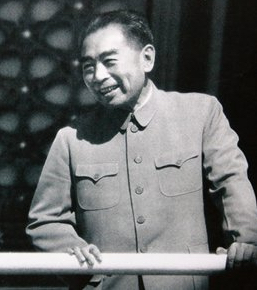
A nation is born: Beijing, 1949
But before we get to that high place, first it is necessary to take one step back. Then we can take many steps forward. To begin understanding the Xi’an Incident, it is necessary to begin with understanding the bitter experience of the Long March and its aftermath.
Beginning with the civil war between the new Red Army, founded in 1927 7 and led in part by Zhou Enlai, and the Nationalist forces, led by Chiang kai-Shek, a titanic struggle was waged for control over China. This internal conflict was combined with the resistance against Imperial Japan, which invaded, occupied and ravaged large parts of China, beginning with the occupation of Manchuria in 1931. 8
In 1934, the Red Army embarked on the Long March, a strategic military action of defiance against the Nationalist forces, covering approximately 6,000 miles (9,656 kilometers) to evade the encircling forces. 9
Zhou Enlai played a significant role in the Long March as one of the key political and military leaders of the People’s Liberation Army, also known popularly as the Red Army. 10 He was involved in the decision-making process and held various leadership positions, including serving as a member of the Politburo and the Central Committee.
- Proclamation of the People’s Republic of China; https://www.theguardian.com/world/from-the-archive-blog/2019/oct/01/mao-zedong-proclaims-establishment-of-peoples-republic-of-china-1949
- Founding of the Red Army; https://www.rusi.org/explore-our-research/publications/commentary/history-plas-ground-force-organisational-structure-and-military-regions
- Why Did Japan Invade Manchuria? https://study.com/learn/lesson/japan-invade-china-manchuria.html
The Beginning: Long March; https://alphahistory.com/chineserevolution/long-march/#Background
10. The Long March; https://www.britannica.com/event/Long-March
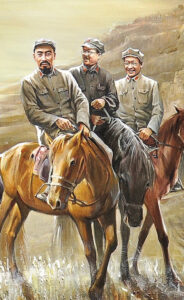
Thousands of soldiers, many of them on horseback, journeyed on the Long March; painting by Liu Xingxiong
As a skilled organizer and strategist, Zhou helped coordinate the overall direction of the Red Army and managed the logistical challenges they faced during the Long March. How to feed, clothe, water, care for and sustain an army in constant motion, every day, month after month, that started out with nearly 85,000 people? 11
The Long March was a pivotal event in the history of the Chinese revolutionary movement, as it marked a turning point in the struggle against the Nationalist forces. The journey was arduous, with the Red Army crossing numerous mountain ranges, rivers, and hostile territories, facing disease, starvation, and constant attack from enemy forces on two fronts. 12 Despite these challenges, the Long March allowed the Red Army to regroup, consolidate its forces, and expand its support base among the rural population.
Zhou Enlai’s diplomatic skills, pragmatism, and ability to work with different factions within the Party made him an indispensable asset in maintaining party unity and fostering cooperation.
As a high-ranking member of the Party and the political commissar of the Red Army, Zhou faced both successes and setbacks during this crucial period. He was responsible for coordinating the overall political and military strategies of the People’s Liberation Army during this time.
His responsibilities during the Long March included maintaining morale and discipline among the troops, and connecting the soldiers in the Army with local populations to secure their support. He also engaged in diplomatic negotiations with rival factions, including the Nationalists and local warlords, in an effort to secure safe passage for the Red Army.
- People’s Liberation Army; History; https://en.wikipedia.org/wiki/People%27s_Liberation_Army
- Suffering during the Long March; https://www.historytoday.com/archive/months-past/long-march
Like many other participants, Zhou Enlai faced extreme physical hardship, malnutrition, disease and exhaustion during the grueling 9,000-kilometer trek, much of it across open terrain, mountains and plains, and across rivers.
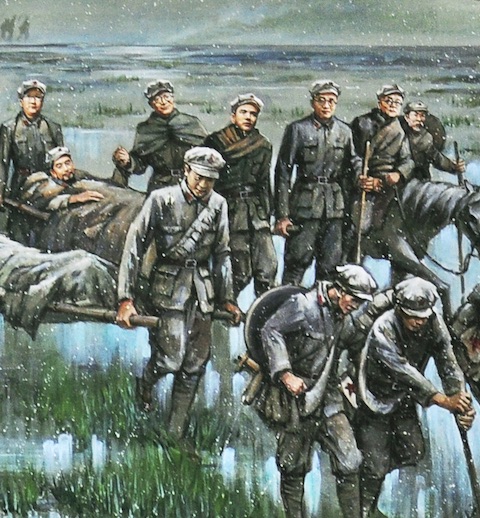
Zhou Enlai and many of his troops suffered and survived disease and hardship as they crossed China; painting by Liu Xingxiong
Zhou Enlai’s most significant victory during the Long March was his role in the Zunyi Conference in January 1935 13. The conference marked a turning point, confirming the leadership of Mao Zedong.
To understand how a physically small man like Zhou Enlai, previously a scholar and academic, was able to lead powerful and challenged troops so decisively, it is useful to consider the inner character of Zhou Enlai. His motivational skills were just as important as his political, logistical and military strategy skills, in securing eventual victory for the Red Army.
For example, Zhou Enlai was known for his dedication to the welfare of the troops under his command. He often emphasized the importance of proper footwear for the soldiers during the Long March, as they had to travel through harsh terrain, including mountains, swamps, and arid deserts. Zhou believed that well-fitted shoes were crucial for the soldiers’ mobility and endurance. He was known to personally inspect the soldiers’ shoes and help them to find better-fitting ones when needed. 14 This demonstrated his concern for the well-being of the troops, and his understanding of the practical challenges they faced, and helps to explain the many heroic actions that his soldiers were inspired to take by his leadership, defending themselves and saving each others’ lives.
A further illustration of the power of the persuasion of Zhou Enlai is provided in a postscript to this paper, in a scene from a film about meeting Zhou had with Ernest Hemingway. Hemingway wrote, in a letter to U.S. Treasury Secretary Henry Morgenthau, about Zhou Enlai:
- The Zunyi Conference https://alphahistory.com/chineserevolution/long-march/#Zunyi_conference
- Who is CPC? Edgar Snow accounts; https://www.globaltimes.cn/page/202104/1221235.shtml
“Zhou Enlai is a man of great charm and wisdom. He maintains close relationships with ambassadors from many countries. He has succeeded in making an ally of almost every man in Chongqing, leading them to accept the Communist party’s positions on anything.” 15
A series of American diplomats met Zhou Enlai, who always sought out Americans and invited them to talk, whenever he could. John Service, who served as Second Secretary at the U.S. Embassy wrote:
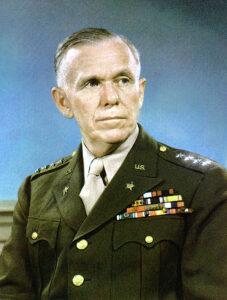
General George Marshall
“He is a very talented, convincing diplomat. He has a glow, and attracts people by the force of personality. His mind is sharp; he is strong-willed, and has well-organized ideas. He tried to make us agree with his views about China and the world — and he is convinced of these views. He did so with calm reasoning, clear words, gentle conversation, and with an extensive knowledge of history and the facts of the world; he has an amazing memory for detail. People are persuaded, but not intimidated, nor are they blamed if they hold different views.” 16
General George Marshall, special envoy to China from America and later Secretary of State, wrote:
“The senior generals in the Kuomin Party, including Chiang kai-Shek, are not negotiating partners like Zhou Enlai. Based on my long-time observation, I believe the Kuomintang cannot find anyone of the quality of Zhou — who is such a tough, skilled and knowledgeable man.” 17
15. Hemingway Quote; Through American Eyes, CCCPC, 2014, page 22; http://www.zhouenlaipeaceinstitute.org/building-peace/through-american-eyes/
16. John Service Quote; Through American Eyes, CCCPC, 2014, page 25; http://www.zhouenlaipeaceinstitute.org/building-peace/through-american-eyes/
17. General George Marshall Quote; Through American Eyes, CCCPC, 2014, page 30; http://www.zhouenlaipeaceinstitute.org/building-peace/through-american-eyes/
National Security Advisor and Secretary of State Henry Kissinger said of the man whom he considered a friend:
“He had a courtly manner, endless patience, extraordinary intelligence and agile ingenuity; during our discussions he made a point to notice how easy it was to understand the essence of our new relationship, for with Zhou Enlai it seemed there was no other sensible choice.” 18
In 2011, on meeting with Zhou Enlai’s nephew Zhou Huazhang in Beijing, Kissinger said privately:
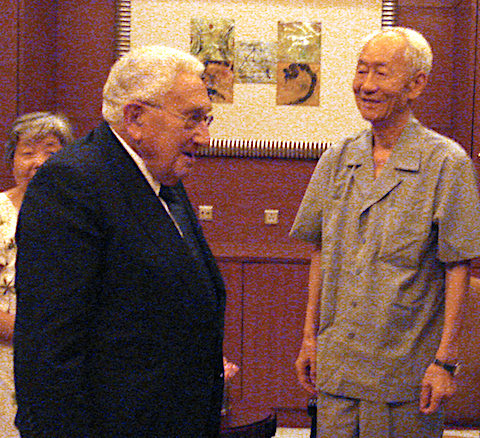
Secretary Kissinger meets Zhou Huazhang, nephew of Zhou Enlai, and his wife, Yunzhen Hou, in Beijing, 2011.
“Zhou Enlai was not only one of the most intelligent people I have ever met; he was also one of the most compassionate. It’s time that the contribution of my old friend to the cause of peace was fully recognized by everyone.” 19On welcoming President Richard M. Nixon to Beijing, Zhou used his legendary charm to encourage a lasting atmosphere of peace, with this toast:
“The American people are a great people. The Chinese people are a great people. Our two peoples have always been friendly. For reasons that we all understand, relationships between our two peoples were interrupted for over twenty years. Now, after a joint effort by both sides, the door to friendly relations has finally opened.” 20
- Henry Kissinger Quote; Through American Eyes, CCCPC, 2014, page 43; http://www.zhouenlaipeaceinstitute.org/building-peace/through-american-eyes/
- Report of the Zhou Enlai Peace Institute on Private Meeting with Henry Kissinger; http://www.zhouenlaipeaceinstitute.org/stories/kissinger-2/
20. President Richard M. Nixon Quote; Through American Eyes, CCCPC, 2014, page 53; http://www.zhouenlaipeaceinstitute.org/building-peace/through-american-eyes/
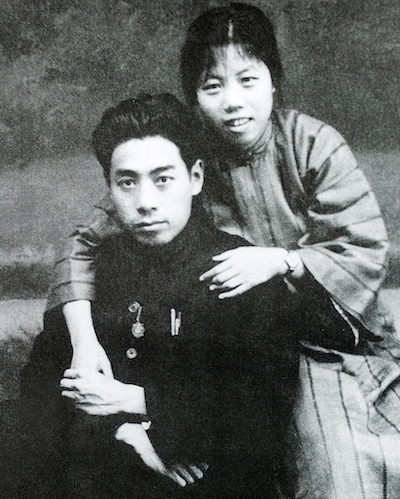
The future Premier, Zhou Enlai, and Deng Yingchao, his wife, in Guangzhou
During the Long March, Deng Yingchao, Zhou Enlai’s wife, was one of just a few women leaders to accompany the troops the entire way. Her husband was always sensitive, listening to her needs and counsel, and treating her as an equal. She was a leader for women’s rights from the beginning, had been part of the May 4th Movement in Beijing, the Awakening Society in Tianjin, and later founded the All- China Women’s Federation. 21 She commanded great respect, regardless of who her husband was.
Seeing that their commander, Zhou Enlai, treated his wife and all women in the Army with such respect, his soldiers were further inspired to support Zhou’s traditional Chinese values, and to fight for the human rights and liberty of their mothers, wives and daughters at home.
The seeds of this sincere esteem for women, his deep sensitivity and ability to listen, think and respond carefully, had been planted deep and long before, in the youth of Zhou Enlai in Huai’an, with his mother’s death at age 4. The loss of his mother at such a young age had a profound impact on Zhou, and he later described feeling a sense of loneliness and longing for maternal affection throughout his life. 22
This topic is the subject of a future study paper, but it is sufficient to note: the skills that made Zhou Enlai a charismatic leader, able to sustain the effort to direct the Long March, earn the respect of all he met and bring about the miracle of the Xi’an Incident, were intrinsic to the character of the man, nurtured by his lifelong deep love for Deng Yingchao.
- Deng Yingchao: Champion of Women; https://www.shine.cn/feature/art-culture/1805134473/
- Portrait of Zhou Enlai as a Young Man; video and script; http://www.zhouenlaipeaceinstitute.org/stories/premier-childhood/
Many years after his passing, she wrote to him, the last in a series of love letters between the great couple:
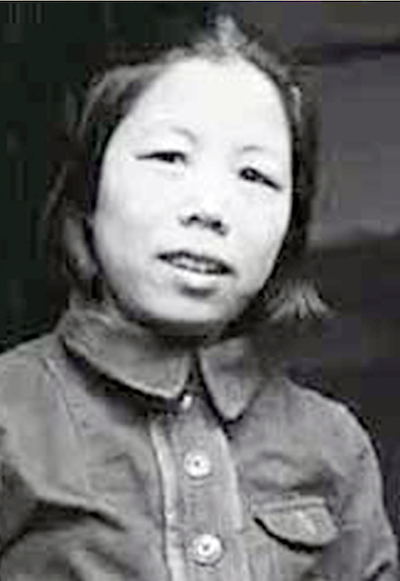
Deng Yingchao
“Our love and the revolution were always intertwined, so both love and revolution stretched over the decades, illuminated by danger, hardship, togetherness; sharing joy and sorrow, sometimes fighting together, sometimes separated in two places.
And after many decades, there has been no decrease in our love.
Whenever I think back through the past, I return to our youth in my imagination, fighting side by side for life.” 23
Zhou Enlai’s leadership during the Long March was marked by his strategic thinking, diplomatic skills, and concern for the troops’ welfare. His ability to navigate complex political and military situations and maintain unity played a critical role in the Red Army’s eventual survival and the establishment of a new base in Yan’an. 24
A final key detail calls out now to be understood, in setting the stage for full understanding of the Xi’an Incident. This is the long, complex relationship between Zhou Enlai and his chief enemy during the Long March, Chiang kai-Shek. 25
- Love, Letters and Revolution; excerpt from Deep Love; video and text; http://www.zhouenlaipeaceinstitute.org/deep-love/love-letters-and-revolution/
24. The Yan’an Soviet; https://alphahistory.com/chineserevolution/yanan-soviet/ - Chiang kai-Shek; https://www.history.com/topics/china/chiang-kai-shek
The two principals of this searing national drama knew each other; they had a shared history many years before, at Huangpu Military Academy in Guangzhou 26, founded in 1924. Chiang was the first commandant of the Academy, and Zhou was involved in leadership of the political department. They helped to form the First United Front. 27
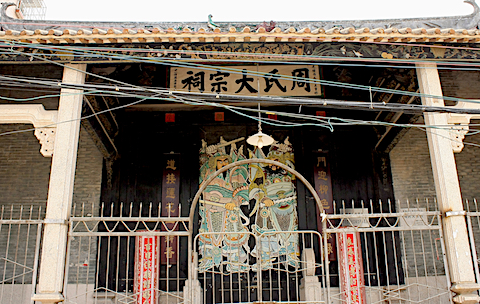
Main entrance to original Huangpu Academy
How did two young, talented, patriotic Chinese men in the 1920’s, who knew each other in the idealism of their youth, become such bitter enemies in later years, fighting for the soul of the New China? They both sought unity and justice for the Chinese people; they both participated in the founding of the Nationalist Party together.
Their initial, fundamental goals were the same; the means they chose were completely different. So why did Zhou choose the path of unity and self-defense; and why did Chiang choose the path of division and collaboration? How did their destinies later converge, with Zhou Enlai holding the power of life and death over his old colleague, his old enemy?
After the breakdown of the First United Front in 1927, Chiang kai-Shek and Zhou Enlai became adversaries. Chiang initiated the White Terror 28, a violent anti-revolutionary campaign, leading to the persecution and execution of numerous young revolutionaries. Zhou, who was working undercover in Shanghai, managed to evade capture and continued his work for the CCP. The two would engage in a political and military struggle over the years, as both the KMT and CCP sought to gain control over China.
- Huangpu Military Academy; A force for unity; https://www.chinadailyhk.com/articles/37/248/109/1533981028322.html
- The First United Front; https://www.wikiwand.com/en/First_United_Front
- The White Terror; https://alphahistory.com/chineserevolution/shanghai-massacre/
During his time based in the French Concession of Shanghai, Zhou played a key role in the development of the Party, at events hosted in the grand old house on Sinan Lu Boulevard. 29
The French Concession in Shanghai was a foreign-controlled area where many political and social elites resided. Its relatively more relaxed political environment, allowed Zhou to engage in various activities in support of the revolutionary cause.
Zhou Enlai’s office there was a hub of political and intellectual activities. Under his leadership, the house became a hub for philosophical discussions and cultural events. Zhou gathered intellectuals, writers, and artists to exchange ideas and debate the future of the nation. These gatherings fostered a sense of camaraderie and unity among the participants. 30
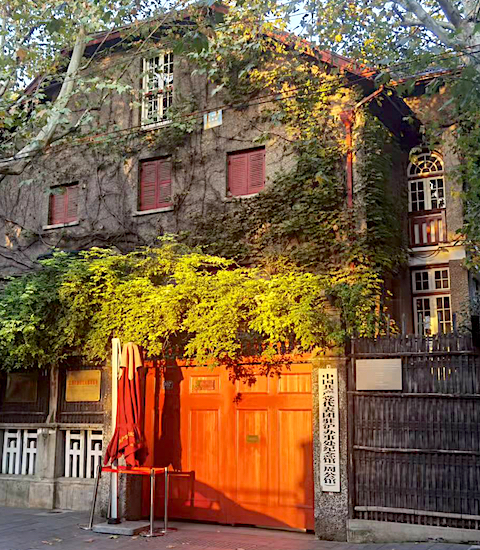
Shanghai Residence, Sinan Lu
In addition to his role as a cultural and intellectual leader, Zhou Enlai also secretly led the security apparatus for the CCP in Shanghai. He was responsible for coordinating intelligence and counterintelligence efforts, as well as ensuring the safety of key leaders and members. Zhou’s keen understanding of political dynamics and his ability to maintain secrecy made him highly effective in this role.
Zhou’s activities did not go unnoticed by the Kuomintang, led by Chiang kai-Shek. The KMT viewed the Party as a threat and sought to suppress its growth. As a result, Zhou and his activities were under constant surveillance by KMT agents. Despite this scrutiny, Zhou managed to maintain a low profile and continued to operate effectively.
Through the intervening years until 1936, these two men grew in strength and achievement. Chiang kai-Shek hunted his former colleague, Zhou Enlai, and his compatriots in the young Red Army. Zhou Enlai was a constant fugitive, and the places where he stayed were under continuous surveillance.
- Zhou Enlai Residence Shanghai; https://www.atlasobscura.com/places/zhou-enlais-former-residence
- Site of the First National Congress; https://en.wikipedia.org/wiki/Site_of_the_First_National_Congress_of_the_Chinese_Communist_Party
Chiang kai-Shek and his Nationalist Party 31, after a promising beginning, chose to favor the interests of the merchants and traders of China, who controlled vast wealth and properties. Chiang gained great personal wealth and power through these alliances, and by claiming to the American and European powers that he would resist the Red Army, whom he identified with their enemy, the Soviet Union.
Zhou Enlai and the Party chose instead to represent the interests of the common people of China, to stay close to their origins in the farms and factories, and to seek equality of opportunity and justice on their behalf. This difference in world-view and principle was at the core of the opposition between the two men.
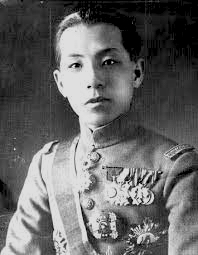
Zhang Xueliang
Before the Xi’an Incident, Zhou Enlai had been working as an agent and negotiator in various cities under Nationalist control. His main task was to facilitate communication between the Red Army and the Nationalists, particularly in their efforts to form a united front against the Japanese aggression.
However, during the Long March leading up to the Xi’an Incident 32, Chiang kai-Shek focused on eradicating the Red Army rather than confronting the growing Japanese threat. The Incident was triggered when two of Chiang’s generals, Zhang Xueliang 33 and Yang Hucheng 34, kidnapped him in Xi’an, demanding that he cease hostilities against the people’s party and form a united front to resist Japanese aggression.
- The Nationalist Party; . https://www.britannica.com/place/China/The-Nationalist-government-from-1928-to-1937
- The Xi’an Incident; https://www.oxfordreference.com/display/10.1093/oi/authority.20110803125214733
- Zhang Xueliang; https://www.newworldencyclopedia.org/entry/Zhang_Xueliang
- Yang Hucheng; https://en.wikipedia.org/wiki/Yang_Hucheng
The main events of the Incident occurred within Xi’an City and at the nearby Huaqing Hot Springs. 35 Here are some specific historic locations: 36
Huaqing Hot Springs: On the morning of December 12, 1936, Chiang kai-Shek was staying at the Huaqing Hot Springs (also known as Huaqing Palace) when he was kidnapped by Zhang Xueliang and Yang Hucheng’s troops.
Xi’an City: After his capture, Chiang kai-Shek was taken to a residence in Lintong District, about 20 kilometers east of Xi’an City center at the time, where he was held captive. Negotiations between Chiang kai-Shek, Zhang Xueliang, and Zhou Enlai took place in the city.
Two contemporary sites commemorate the Xi’an Incident:
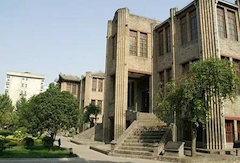
Xi’an Incident Memorial
The Xi’an Incident Memorial Hall 37: This museum is dedicated to the history of the Xi’an Incident and its impact on Chinese history. The memorial hall contains exhibits, photographs, and historical documents related to the Incident, as well as an introduction to the key figures involved.
Huaqing Hot Springs: While not exclusively dedicated to the Xi’an Incident, the Huaqing Hot Springs remains an important historical site related to the event. Visitors can learn about the incident’s connection to the site while enjoying the beautiful natural surroundings.
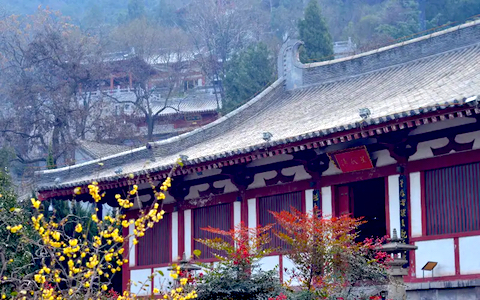
Huaqing Hot Springs; Xi’an
- Huaqing Hot Springs; https://www.chinahighlights.com/xian/attraction/huaqing-hot-springs.htm
- Site of the Xi’an Incident: http://en.chinaculture.org/library/2008-02/15/content_32324.htm
- Xi’an Incident Memorial Hall; http://en.shaanxi.gov.cn/ThisisShaanxi/202009/t20200909_1632382.html
Rushing to X’ian from Nanjing by military plane, Zhou Enlai confronted his former colleague, and stopped his possible execution. He sat down with him, together with other Red Army and Nationalist officials, for several days, and they talked, through the day and night. Zhou used his inexhaustible persuasiveness to pursue unity on behalf of the young Chinese nation; he sought understanding and peace with his enemy, in place of vengeance.
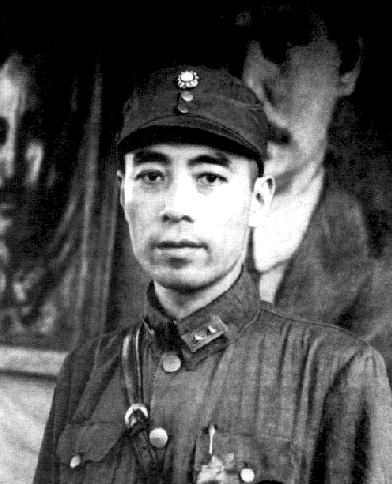
During the Xi’an Incident, Zhou Enlai acted as an intermediary between the Red Army, the Nationalist Kuomintang government, and the rebellious generals. Given his diplomatic skills, personal presence and credibility with all sides, Zhou was instrumental in defusing the crisis and negotiating Chiang’s release. He worked tirelessly to ensure that the negotiations resulted in a favorable outcome for the Red Army while maintaining the delicate balance between the various factions involved, and not compromising the principled stand of the Party on behalf of the people. 38
After the Xi’an Incident, the Red Army and the Kuomintang formed the Second United Front, a temporary alliance against Japanese aggression. Zhou’s role in the aftermath of the Xi’an Incident was to maintain communication and coordination between the two parties. As a key figure in the Party, Zhou continued his diplomatic efforts to strengthen the alliance and navigate the complex political landscape during the Sino-Japanese War and the later stages of the Chinese Civil War.
The dialog between these powerful men, much of it in private and one-on-one, stretched over two weeks. Zhou recalled their shared idealistic youth, when they had been united in the cause of all Chinese people. He made Chiang feel young again, hopeful; he helped him cast off bitterness, guilt and suspicion. And he did something quite unexpected: he extended a hand of forgiveness to Chiang, for all the terrible suffering and violence he had inflicted, in the name of the young nation striving to be born.
- Result of the Xi’an Incident; https://military-history.fandom.com/wiki/Xi%27an_Incident#Repercussions
Supported by these newfound waves of good will, Zhou Enlai also provided Chiang kai-Shek with a practical, hard-headed political and military proposition. The proposition: all Chinese would join forces against Japan, and stop fighting each other. In this way, both would win. The people would win, the nation would win.
Two famous photos of Zhou were taken during this critical time; one was taken before the Xi’an Incident and shows him traumatized, intense, bearded, with a stare of a thousand miles; most of the people he knew from the Long March were gone, dead or exiled; only 8,000 survived out of nearly 85,000 who began. He had seen and lived through the unspeakable horrors of war.
The second photo, taken just a few months later after the Xi’an Incident, shows Zhou at peace, clean-shaven, with a look that penetrates from deep within. 39
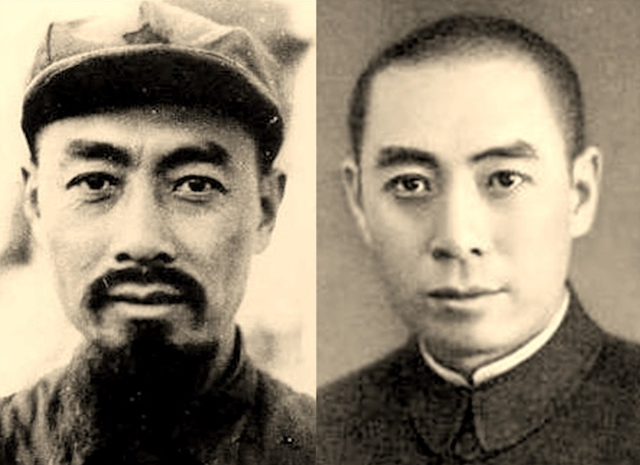
We have begun to understand the enigma implied by these two photos. The author of this paper believes that the anonymous, mysterious title of “The Xi’an Incident” might now be modified: “The Xi’an Miracle.”
- Photos of Zhou Enlai – Animation; http://www.zhouenlaipeaceinstitute.org/stories/photos-xian-incident/
Finally: the implications of the 1936 showdown between Zhou and Chiang still echo today, expressed in the conflict between Taiwan and the People’s Republic of China. We know that, in his final days, Premier Zhou Enlai said, “Let us never forget our friends in Taiwan.”
Is there a seed of insight here into today’s struggle, in the way Zhou Enlai commanded the Xi’an transformation in 1936, that may provide guidance to solve the challenges of today, nearly 90 years later?
For some understanding of this question, consider the life of General Zhang Xueliang 40.
After the Xi’an Incident, Chiang kai-Shek arrested Zhang Xueliang (who had accompanied Chiang back to the capital of Nanjing) and kept him imprisoned there for more than 10 years. Brought to Taiwan in 1949, Zhang remained under house arrest for many more years. Yang Hucheng did not fare so well; he was dismissed from his post and sent abroad. When he returned in late 1937, he was arrested and imprisoned, and in 1949 Chiang secretly ordered his execution.
During his time under house arrest, Zhang was allowed to study and read, and he developed a deep interest in history, literature, and philosophy. 41
- Imprisonment of Zhang Xueliang; Nanjing, Taiwan, later life in Hawaii; https://www.newworldencyclopedia.org/entry/Zhang_Xueliang#Xi.27an_Incident.2C_House_Arrest.2C_and_Later_Life
- Calligraphy, Artwork; Zhang Xueliang; https://binged.it/3MnIu7V
After the Nationalists retreated to Taiwan in 1949, Zhang was moved to the island along with Chiang Kai-shek’s government. Zhang remained under house arrest in Taiwan for decades, living a secluded life with his wife, Edith Chao, and their children. His captivity was kept secret from the public, with very few people outside his immediate family aware of his whereabouts.
In 1993, Zhang Xueliang was finally released from house arrest after the death of Chiang kai-Shek’s son and successor as the leader of Taiwan. By then, Zhang was in his 90’s, and the Taiwanese government allowed him to travel to the United States for medical treatment. Zhang and his wife settled in Honolulu, Hawaii, where they lived out the rest of their lives in relative peace and privacy. Zhang passed away on October 15, 2001, at the age of 100.
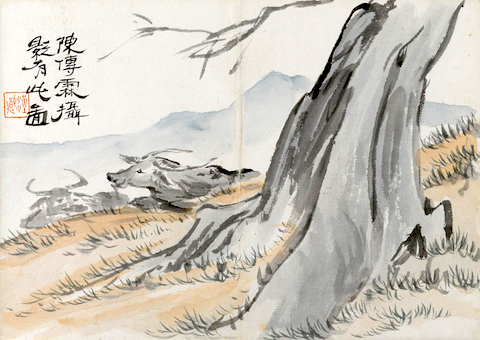
Original painting by Zhang Xueliang
Zhang Xueliang remains an influential figure in Chinese history due to his role in the Xi’an Incident and its impact on the course of the conflicts of the day. He is regarded as a hero, both in Taiwan and in Beijing.
Zhou Enlai’s evaluation of Zhang Xueliang and Yang Hucheng: “National heroes, eternal heroes.”
Despite his many years in captivity, Zhang maintained his intellectual pursuits and contributed to the rich tapestry of 20th-century Chinese history, with poetry, artwork and calligraphy of fine and pure quality.
Today, when people from China visit Hawai’i, one of their first stops is often Temple Valley, 42 about 20 minutes drive from central Honolulu in Kaneohe. There, an exquisite tomb is lovingly maintained, and fresh flowers are brought regularly. People walk there slowly, deep in thought, looking across the beautiful valley, honoring his memory.
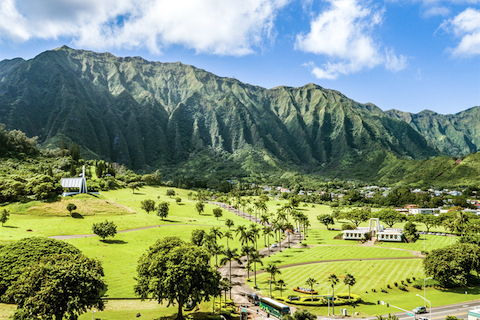
Temple Velley, near Kaneohe, on the windward shore of O’ahu, Hawai’i.
- Valley of the Temples; https://www.valley-of-the-temples.com/about-us/
Across a nearby ridge is an extraordinary Japanese temple, with a lake populated by large, beautiful koi, surrounded by bamboo. A huge iron bell rings out from the Japanese temple from time to time. 43
Friends, enemies, life and death; hope, sorrow, forgiveness and regret, combined closely together in the pure Hawaiian breeze.
In 1993, the grand-niece of Zhou Enlai, Zhou Xiaofang, and her brother, Zhou Qing, visited the old General, Zhang Xueliang, in his condominium at the Hilton Hotel.
Xiaofang reports, of this meeting: “At first it was hard to see the great General in this old, weak man. But soon I could feel the memory of Premier Zhou Enlai reaching out through him, and I recognized Zhang Xueliang as Zhou would see him:
“Family.”
Some years later, in 1999, Zhou Xiaofang returned with her aunt, Zhou Binjian, to visit Zhang Xueliang again. At that time, he wrote a poem:
“Good dreams are not fulfilled, sad dreams are short,
A false name will eventually lead to a wrong life.”
- Byodo-in Japanese Temple; https://byodo-in.com/
In the spirit of reconciliation and wisdom so clearly demonstrated in the Xi’an Incident, perhaps there is an example in Temple Valley for today, that will move people in Mainland China and Taiwan to recall the essence of unity.
To speak, listen and act for the harmony of all the people of China, as an example to all the divided nations of the world.
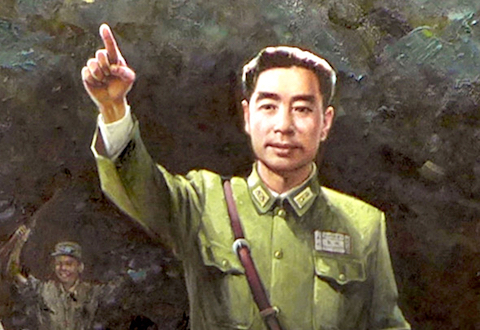
painting by Liu Xingxiong
POSTSCRIPT
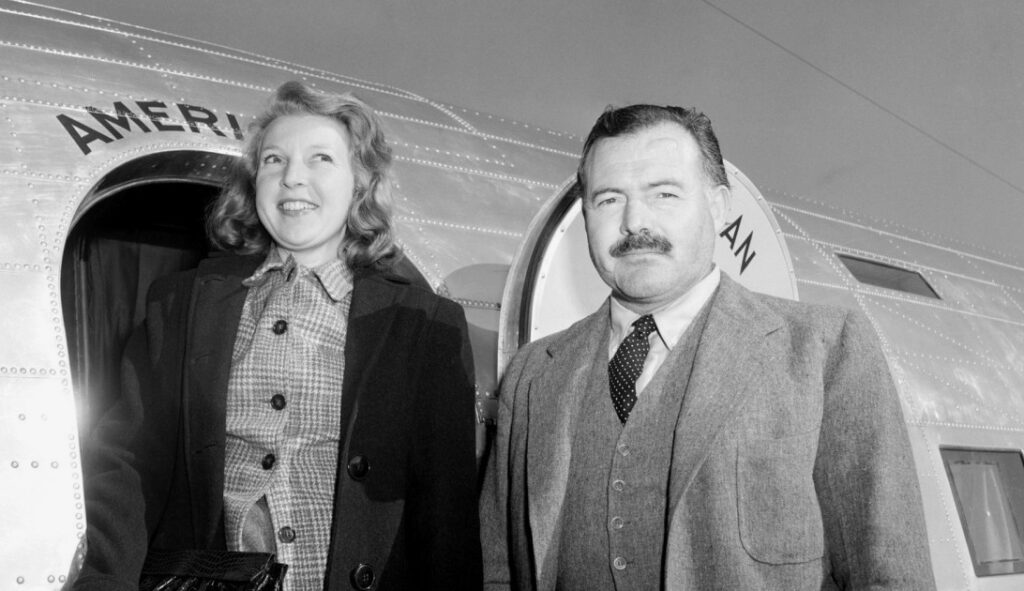
Ernest Hemingway and Martha Gelhorn in Chian, where they interviewed Zhou Enlai
The following dialog is excerpted from the 2012 film, “Hemingway and Gelhorn,” 44 with Nicole Kidman as Martha Gelhorn, Clive Owen as Ernest Hemingway, and Anthony Brandon Wong as Zhou Enlai.
Ernest Hemingway, accomplished American journalist and novelist, was in China in 1941, on honeymoon with his new wife, Martha Gelhorn, a well-known American journalist writing for Collier’s Magazine. Hemingway would later win the 1954 Nobel Prize for literature.
They had an interview with General Chiang kai-Shek in Chongqing, together with his wife, Mme Chiang. At the time, Chiang ruled that part of China with brutal efficiency.
The two couples shared some chocolates and tea, and Mme Chiang gave Gelhorn an antique Chinese jade brooch. She told Hemingway and Gelhorn not to worry about Zhou Enlai and his resistance army.
Later, the American couple are taken secretly by agents loyal to Zhou Enlai, to a camp in the remote hills, where they are shown into a protected meeting with Zhou Enlai.
44. Hemingway and Gelhorn; https://en.wikipedia.org/wiki/Hemingway_%26_Gellhorn
ZHOU ENLAI:
I am Zhou. Zhou Enlai. The one you’re not supposed to worry about.
MARTHA GELHORN:
Hello, Zhou. I’m Gelhorn.
ERNEST HEMINGWAY:
Hemingway.
ZHOU ENLAI:
A drink. To Hemingway. And Gelhorn… Your connections in Hollywood sound very glamorous.
GELHORN:
Not as glamorous as an underground Communist leader up against the Generalissimo.
ZHOU ENLAI:
Ah, yes. I live simply, because my people live simply. Most of us do not have chocolates.
HEMINGWAY:
You have excellent intelligence.
ZHOU ENLAI:
Gelhorn, I see you have one of Madame’s jade brooches.
GELHORN:
She was very insistent.
ZHOU ENLAI:
Did she mention they are made by blind children? The Chiangs own the factory.
My friends in America tell me you know Eleanor Roosevelt.
GELHORN:
Yes, quite well.
ZHOU ENLAI:
A brilliant woman. Inform her that the Generalissimo is the past. The Communist victory is inevitable.
I wish we had more time to talk, but unfortunately I have a country to defend against the Japanese invaders.
Take care.
Acknowledgments: Sincere thanks to The Zhou Enlai Study Center, Beijing; the Zhou Enlai School of Government, Nankai University, Tianjin; the Zhou Enlai National Memorial and Residence, Huai’an; the Zhou Enlai-Deng Yingchao Memorial, Tianjin; the Zhou Enlai Residence, Shanghai; to Liao Xinwen, Xu Xing, Zhou Bingde, Lin Fanlin, and all members of the Zhou Family, nationwide in China. Images created by Liu Xingxiong, who painted a spectacular set of large oil canvases commemorating the Long March.
All References:
- Battle of Valley Forge; https://www.history.com/topics/american-revolution/valley-forge
- The Amritsar Massacre; https://www.historytoday.com/archive/months-past/amritsar-massacre
- Battle of Waterloo; https://www.britannica.com/event/Battle-of-Waterloo
- The Long March, an Epic Feat; https://news.cgtn.com/news/3d456a4e7a517a6333566d54/index.html
- Significance of The Long March; http://afe.easia.columbia.edu/special/china_1900_mao_march.htm
- Proclamation of the People’s Republic of China; https://www.theguardian.com/world/from-the-archive-blog/2019/oct/01/mao-zedong-proclaims-establishment-of-peoples-republic-of-china-1949
- Founding of the Red Army; https://www.rusi.org/explore-our-research/publications/commentary/history-plas-ground-force-organisational-structure-and-military-regions
- The Beginning: Long March; https://alphahistory.com/chineserevolution/long-march/#Background
- Why Did Japan Invade Manchuria? https://study.com/learn/lesson/japan-invade-china-manchuria.html
- The Long March; https://www.britannica.com/event/Long-March
- People’s Liberation Army; History; https://en.wikipedia.org/wiki/People%27s_Liberation_Army
- Suffering during the Long March; https://www.historytoday.com/archive/months-past/long-march
- The Zunyi Conference https://alphahistory.com/chineserevolution/long-march/#Zunyi_conference
- Who is CPC? Edgar Snow accounts; https://www.globaltimes.cn/page/202104/1221235.shtml
- Hemingway Quote; Through American Eyes, CCCPC, 2014, page 22; http://www.zhouenlaipeaceinstitute.org/building-peace/through-american-eyes/
- John Service Quote; Through American Eyes, CCCPC, 2014, page 25; http://www.zhouenlaipeaceinstitute.org/building-peace/through-american-eyes/
- General George Marshall Quote; Through American Eyes, CCCPC, 2014, page 30; http://www.zhouenlaipeaceinstitute.org/building-peace/through-american-eyes/
- Henry Kissinger Quote; Through American Eyes, CCCPC, 2014, page 43; http://www.zhouenlaipeaceinstitute.org/building-peace/through-american-eyes/
- Report of the Zhou Enlai Peace Institute on Private Meeting with Henry Kissinger; http://www.zhouenlaipeaceinstitute.org/stories/kissinger-2/
- President Richard M. Nixon Quote; Through American Eyes, CCCPC, 2014, page 53; http://www.zhouenlaipeaceinstitute.org/building-peace/through-american-eyes/
- Deng Yingchao: Champion of Women; https://www.shine.cn/feature/art-culture/1805134473/
- Portrait of Zhou Enlai as a Young Man; video and script; http://www.zhouenlaipeaceinstitute.org/stories/premier-childhood/
- Love, Letters and Revolution; excerpt from Deep Love; video and text; http://www.zhouenlaipeaceinstitute.org/deep-love/love-letters-and-revolution/
- The Yan’an Soviet; https://alphahistory.com/chineserevolution/yanan-soviet/
- Chiang kai-Shek; https://www.history.com/topics/china/chiang-kai-shek
- Huangpu Military Academy; A force for unity; https://www.chinadailyhk.com/articles/37/248/109/1533981028322.html
- The First United Front; https://www.wikiwand.com/en/First_United_Front
- The White Terror; https://alphahistory.com/chineserevolution/shanghai-massacre/
- Zhou Enlai Residence Shanghai; https://www.atlasobscura.com/places/zhou-enlais-former-residence
- Site of the First National Congress; https://en.wikipedia.org/wiki/Site_of_the_First_National_Congress_of_the_Chinese_Communist_Party
- The Nationalist Party; . https://www.britannica.com/place/China/The-Nationalist-government-from-1928-to-1937
- The Xi’an Incident; https://www.oxfordreference.com/display/10.1093/oi/authority.20110803125214733
- Zhang Xueliang; https://www.newworldencyclopedia.org/entry/Zhang_Xueliang
- Yang Hucheng; https://en.wikipedia.org/wiki/Yang_Hucheng
- Huaqing Hot Springs; https://www.chinahighlights.com/xian/attraction/huaqing-hot-springs.htm
- Site of the Xi’an Incident: http://en.chinaculture.org/library/2008-02/15/content_32324.htm
- Xi’an Incident Memorial Hall; http://en.shaanxi.gov.cn/ThisisShaanxi/202009/t20200909_1632382.html
- Result of the Xi’an Incident; https://military-history.fandom.com/wiki/Xi%27an_Incident#Repercussions
- Photos of Zhou Enlai – Animation; http://www.zhouenlaipeaceinstitute.org/stories/photos-xian-incident/
- Imprisonment of Zhang Xueliang; Nanjing, Taiwan, later life in Hawaii; https://www.newworldencyclopedia.org/entry/Zhang_Xueliang#Xi.27an_Incident.2C_House_Arrest.2C_and_Later_Life
- Calligraphy, Artwork; Zhang Xueliang; https://binged.it/3MnIu7V
- Valley of the Temples; https://www.valley-of-the-temples.com/about-us/
- Byodo-in Japanese Temple; https://byodo-in.com/
- Hemingway and Gelhorn; https://en.wikipedia.org/wiki/Hemingway_%26_Gellhorn
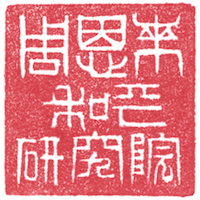
© copyright 2023, Zhou Enlai Peace Institute


